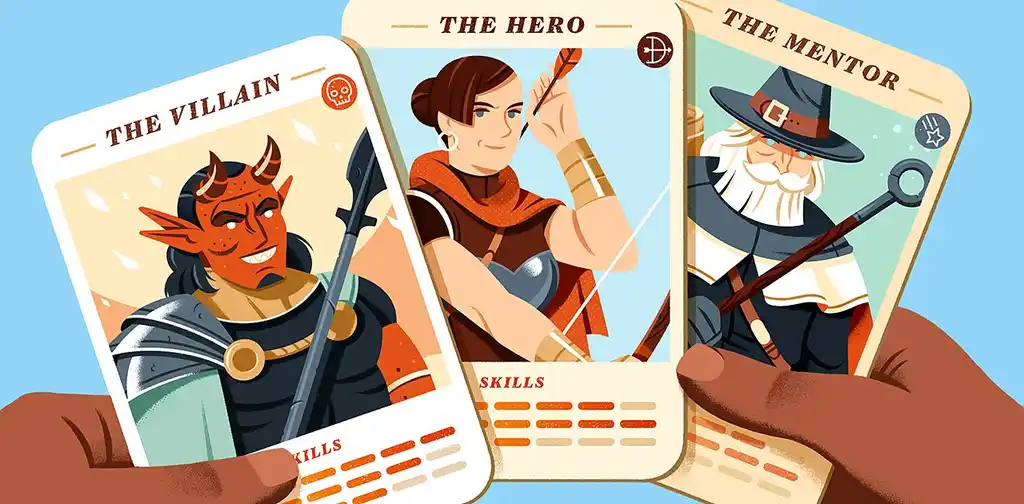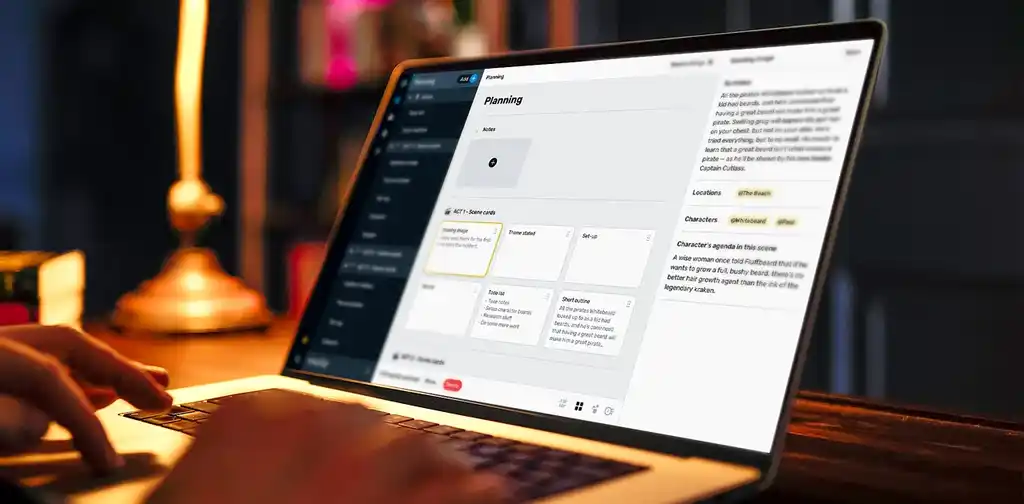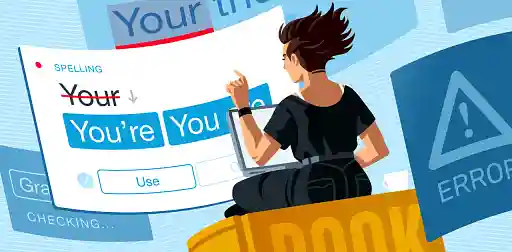Last updated on Oct 24, 2025
How to Create the Ultimate Character Profile [+ Template]
Dario Villirilli
Editor-in-Chief of the Reedsy blog, Dario is a graduate of Mälardalen University. As a freelance writer, he has written for many esteemed outlets aimed at writers. A traveler at heart, he can be found roaming the world and working from his laptop.
View profile →Ask any great novelist, and they’ll likely tell you that good writing starts with good characters. But building characters from the ground up is also one of the toughest hills to climb, especially if you’ve struggled with those all-too-revealing questions:
- Are my characters convincing?
- Do my characters have depth?
- How do I make sure my character shows progression and change?
If you’re having these doubts, you might want to turn to the age-old solution: a character profile.
Here's some of the key elements of a solid character profile:
|
Section |
Category |
Key Elements |
|
Basics |
Name, age, place of birth, current location, nationality, education, occupation, income |
|
|
|
Physical appearance |
Eye color, hair color, build, scars, tattoos, birthmarks, clothing style, accessories, grooming level |
|
|
Movement |
Walking style, posture, gestures, mannerisms, handwriting |
|
|
Speech and communication |
Pace, style, accent, catchphrases, gestures, type of laugh, type of smile, level of emotional expressiveness, if they maintain eye contact |
|
Personal History |
Hometown, childhood type (sheltered, neglected etc.), education, jobs, hobbies, key memories, regrets, turning points, criminal history |
|
|
|
Family |
Parents, siblings, children, extended family (note the ages, occupations and relationships of each) |
|
|
External relationships |
Friends, enemies, social perception from strangers, social media use, role in friendship group (e.g. leader, joker), support system (e.g. mentor) |
|
Personality |
Street/book smart, optimist/pessimist, intro/extrovert, fears, flaws, strengths |
|
|
|
Drivers |
Story goal (what they want), Story motivation (why they want it) |
|
|
Values |
Moral compass, approach to power/love/change, secrets, pet peeves, bucket list |
What is a character profile?
A character profile is a detailed biography of a fictional character that includes their age, appearance, personality, backstory, and their relationships with others. By exploring every layer of character development, it helps authors better craft three-dimensional and memorable characters.
In this post, we will show you our three-part process for assembling a character profile.
What makes a good character profile template?
Many character bibles present exercises that ask you, “If your character was a color, what color would they be?” For many writers, this is either overkill or a bit too 'woo-woo' for their tastes, and they prefer to create a profile that deals in verifiable facts: height, age, and profession.
Q: What drawbacks are there to creating detailed dossiers on characters before the drafting stage?
Suggested answer
Writing is chemistry. It involves experiment and trial, and like every experiment there are occasionally unexpected results. With fiction especially, you may not have a full idea of a character until you begin writing them in different scenarios and relationships -- and I think this is an advantage when you begin your project. Having a fully detailed dossier on a character before you begin can limit your options or contribute to writer's block. After all, characters are not stagnant. They grow and evolve with you as the project forms. You may not realize an aspect of your character until you begin writing and imagining them, or until you have a rough draft. Remember, writing is revision and part of what may need revision are your characters. Having the flexibility to revise may involve leaving part of your characters with only small amounts of scaffolding.
This isn't to suggest you shouldn't have some idea of who your characters are and where they're going. Identifying some core attributes or principles can serve as handy rules for how your characters will act, think, and talk in different scenarios, which can ensure consistency while giving your characters the flexibility to grow into fully fledged personalities. What is their positionality? Their hopes and dreams? Their purpose? What end do you wish them to have? These are open ended questions to ask yourself about your characters that don't commit them to a full dossier.
Mitchell is available to hire on Reedsy ⏺
Absolutely! The main drawback is that creating dossiers can get in the way of writing the book. It's easy to get lost in the fun of research and imagining backstories and details (which may or may not matter). And it's even easier to feel like we're being productive while crafting character sketches or other support documents, when in fact, we're really procrastinating! I find it more helpful to jot down quick notes about the character as I'm writing. This helps me keep things straight while also forcing me to write the story not the sketch.
Caryn is available to hire on Reedsy ⏺
I find it helpful to have at least the basic character arc for the main character. I can also provide my clients with a multi-page character development Q & A, which writers may find a useful tool for later characterisation, even if not all the details end up on the page.
Eva maria is available to hire on Reedsy ⏺
Like world building in any novel, creating detailed character profiles can be beneficial to some authors. They're a way to 'get a feel' for you characters before diving into the story. But going too detailed can lead to a few drawbacks:
- If you have too much on your character, when you actually start writing it might not feel as organic to explore who these characters are, since much of them has already been mapped out
- Sometimes you won't know everything there is to know about a character, and spending too much time pre-writing trying to figure it out keeps you from actually writing it
- Similarly, with any kind of plotting, worldbuilding, character building, and more, I sometimes see authors get so caught up in planning for the book they're going to write that they don't, you know, write the book.
Writing a book is a daunting task, so it's understandable that you want to have as much planned out as possible. But what I always recommend to authors I work with, and especially authors who are stuck on where to go next with their book or how to start, is to get just enough down to where they feel like they have a rough idea of where the book's going, and then to simply start writing. You might have a few hiccups, you will very likely have to edit some things or pause to redraft parts of your outline (if you use one), but once you start writing typically ideas start to flow and you're able to fill in more of the gaps that were empty before.
Sean is available to hire on Reedsy ⏺
One of the main drawbacks to detailing too much of your characters at the outset is that you'll feel like there's less room for them to act spontaneously when various situations (that you don't yet know about!) come up in the story. I'd generally recommend taking a more broad strokes approach to character detailing so that you've got more wiggle room, and don't feel so hemmed in by your original conception of who your characters are. Let them breathe. Let them react more in the moment as you write.
Brett is available to hire on Reedsy ⏺
Our suggestion lies somewhere between those two approaches, where you build a holistic picture of your character in the context of your story. Our character profile worksheet is in three parts. If you treat a person like an apple, they’re going to have three layers of depth: the “skin,” the “flesh,” and the “core.” (Otherwise known as their physical appearance, backstory, and psychology.) That’s how this character profile template is structured — and if you have a particular area that you’d like to hone, you can skip to it below. Otherwise, this character bible will start with the eagle eye’s view of your character.
The Three-Part Character Profile Template:
How to create a character profile
As another reminder, we strongly recommend our character profile template in a PDF format and fill it out as you go along! Download it below for free right here.

FREE RESOURCE
Reedsy’s Character Profile Template
A story is only as strong as its characters. Fill this out to develop yours.
1. Construct the character's outer appearance
To be able to identify a criminal, detectives build a painstakingly thorough file of said criminal’s physical characteristics.
That’s the goal of this section, which covers the “skin” of your character: everything from their outer appearance to the way that they speak. Think of it as a kind of offender profile — one that can help you spot your character in the middle of a crowded Times Square.
Q: What does it mean to create an “original” character in fiction?
Suggested answer
Original characters are those who are subverted stereotypes, who have things about them which are conflicting, who go against the grain in some way and who speak, think and react in ways that are not predictable.
Vanessa is available to hire on Reedsy ⏺
An original character feels and seems real and believable. They do not closely resemble a character that is well known in literature and have their own unique personality, desires, and set of circumstances.
Melody is available to hire on Reedsy ⏺
I think writing an original character just means that when a reader engages with that character, no other particular character comes to mind. Bit of a pithy answer, I know, but there you go. 😉
Brett is available to hire on Reedsy ⏺
The Basics 📖
- Name
- Age
- Place of birth
- Current location
- Nationality
- Education
- Occupation
- Income
Physical Appearance 👀
What's their:
- Eye color?
- Hairstyle?
- Build?
Do they have any distinguishing features (tattoos, scars, birthmarks)?
What's their preferred outfit?
Do they wear glasses? 👓
What accessories are ALWAYS associated with them (cane, pipe, necklace, etc.)? 🌂
What's their usual level of grooming?
- Disheveled
- Smart, very put together
- Untidy but clean
- Other?
Q: What are the most overused character clichés writers should avoid?
Suggested answer
Green eyes. And eyes that glow, that swirl, that change color, have flecks that dance, and can be seen from absurd distances. Fantasy books are full of this stuff. It gets tiresome. And while we're at it, does every feisty female have to have red hair?
Doreen is available to hire on Reedsy ⏺
Do they have any distinguishing “tics” and mannerisms?
What's their health like? Do they suffer from chronic illnesses? 🏥
Describe their handwriting (sloppy, neat, careful, unintelligible). ✍
How do they walk? 👣
- Confident, powerful strides
- Lazy stroll
- Fast, walks at a clip
- Distracted, eyes on the ground
- Other?

FREE OUTLINING APP
Reedsy Studio
Use the Boards feature to plan, organize, or research anything.
Speech and Communication 💬
How do they talk (rapid, slow, measured, drawl, etc.)?
What's the style of their speech (elevated, educated, peppered with slang, etc.)?
Do they have an accent?
Posture:
- Stiff, military
- Slouching
- Casual and relaxed
- ‘Turtle,’ tired
- Other?
Do they gesture?
- Only when agitated or eager
- Doesn’t gesture
- Compulsive “hand-talker”
- Controlled, only to make a point
- Other? If so, explain:
How much eye contact do they like to make (direct, shifty, etc.)?
What's their preferred curse word?
What's their catchphrase?
Any speech impediments?
What are any distinguishing speech “tics”?
What's their laugh like? What do they tend to find funny?
Describe their smile?
How emotive are they? Do they wear their emotions on their sleeve? How easily can others read them?
They have a resting _____ face.
- Bitch 😒
- Angel 😇
- Neutral 😐
- Other?
2. Build out the character's backstory
Characters don’t exist in a vacuum — they’re a product of their environment.
This section in the character template dives a bit deeper into your character and covers their “flesh”: the people, circumstances, and formative influences that filled them out and made them who they are today. It’s the springboard to your character’s biography.
Q: What is the most crucial piece of backstory an author should understand about their protagonist before beginning a novel?
Suggested answer
Whether in the backstory or in the current action of the book, once the reader starts reading, the author should know what their character wants. It can be a long-held desire or something new, based on changed circumstances.
There has to be a motivation and drive in the character. Or if there isn't any, and that is sort of the point of the book, you want to let the reader know why and what in their past has made them the way they are. This sort of "motivation" is a good thing to search for in each character. What has shaped them to do what they do and behave the way they behave in the story? They must stay "in character" throughout the book unless some sort of inner or outer impetus has forced them or inspired them to change their ways.
So this most crucial piece of backstory might be why your protagonist behaves the way they do, what motivates them and why, and what they want.
Melody is available to hire on Reedsy ⏺
The Past ⏪
What's the name of their hometown? 🏡
What type of childhood did they have (sheltered, neglected, etc.)?
Describe their education. 🍏
Were they involved in organizations and clubs at school?
- Sports ⚽
- Debate 🗣
- Gay / Straight Alliance
- Model UN
- Drama 🎭
- Other? If so, explain:
At graduation, they were named Most Likely To ___________ in the yearbook. 🎓
Jobs (if applicable)? What would their résumé look like? 💼
What was their dream job as a child? Why?
Who were their role models growing up? Describe them. 👨👦
What's their greatest regret?
What were their hobbies growing up? ⛳
Favorite place to be as a child?
What's their earliest memory?
What's their saddest memory?
What's their happiest memory?
What's their clearest memory?
What are their skeletons in the closet? 💀
If they could change one thing from their past, what would it be? Why? ⏳
Describe the major turning points or “life beats” in childhood.
What are three adjectives to describe them as a child?
What advice would they give to their younger self?
List their criminal record. ⚖

NEW REEDSY COURSE
How to Write a Novel
Enroll in our course and become an author in three months.
Family 👪
Father 👨
- Age (if living)
- Occupation
- Briefly describe their relationship with your character
Mother 👩
- Age (if living)
- Occupation
- Briefly describe their relationship with your character
Siblings👧
- How many?
- What are their names and ages?
- Briefly describe their relationship(s) with your character
Children 👶(if applicable)
- Age (if living)
- Occupation
- Briefly describe their relationship with your character
Extended family 👴
- Grandparents
- Uncles and aunts
- Cousins
- Other
What's their family's economic status? 💰
How often do they see their family in a year?
External Relationships 💜
Who are their closest friends? Describe them.
Who are their other significant friends? 👋
Enemies? Describe them. 😡
How are they perceived by:
- strangers in the street?
- acquaintances at a work function?
- colleagues in the office?
- authority figures?
- friends in their friend circles?
- children?
- the opposite sex?
- extended family?
What social media platforms are they on?
- X (formerly known as Twitter)
- TikTok
- Snapchat
- BeReal
- Tumblr
- Other? If so, explain.
How would they use their social media platforms?
How would they fill out an online dating profile for themselves? ✨
What’s their role in a group dynamic? 💡
- Leader
- Joker
- Parent
- Hype man
- Mooch
- Other? If so, explain.
Who do they depend on for:
- practical advice?
- mentoring
- a wingman?
- emotional support?
- moral support?
How quickly do they respond to emails? 📨
What do they want from a relationship?
Who would be their ideal partner? 💖
Who is their significant other? Describe them. 💕
How many people would attend their funeral?
3. Understand the character's goals and motivations
We’ve come now to the “core”: who your character is deep down.
This section in the character profile worksheet covers the “heart” of your character. If a backstory shapes a dynamic character, this will define them. More importantly, it will help inform the two most important points leading up to your novel: the character’s story goal and what drives them.
Q: Does a protagonist have to change over the course of their story?
Suggested answer
Great question! And as with so many answers when it comes to writing fiction, the answer is 'yes and no'. Let me elaborate...
Sometimes, a change in a character and how it happens is the entire point of a story. Look at 'A Christmas Carol' by Charles Dickens, for example: Scrooge must look into his past and understand how his life has brought him to this point. For him, if he doesn't change, he will die a lonely and unmourned death. For us, if he doesn't change, then all we really have is a book about a man shouting at Christmas.
And then sometimes there is a Katniss Everdeen. Her qualities of bravery and knowing what's right are there from the start - she wouldn't substitute for her sister otherwise. Those characteristics remain strong throughout. The change in the Hunger Games books are often about the changes Katniss brings to the world around her; her main job in the narrative is as an agent of change, as someone who is unafraid to stand up for what's right. We often see this in superheroes.
I'm also thinking about Harry Potter, who doesn't so much change as have knowledge revealed to him that changes the way he sees himself. Yes, he gains skills and knowledge as the books progress, but he is (literally) marked to be who he is from the beginning. The change here is in his understanding of who and what he is, and what happened to him and his parents - something that the reader discovers along with him.
So I'd say that there always has to be change - otherwise, why would we read a book at all?
And change will definitely occur around the protagonist.
But that doesn't necessarily mean that the character begins as 'a', goes through 'b' and becomes 'c'. This is what makes fiction so interesting, to read and to write.
Stephanie is available to hire on Reedsy ⏺
No. But in most cases, it's probably a good idea.
This criticism ("protagonist needs development/arc/change") is often shorthand for "this story doesn't have much craft to it" or "there's no arc to this thing." If the protagonist has no arc, good chance the story doesn't, either—but this isn't a hard-and-fast judgment.
The better question to ask is whether your protagonist should change. If not, you should have a firm idea why not, and so should your reader by the end. What would the character's not changing say, mean, or do? Is it a tale where everyone knows the protagonist needs to change, but he doesn't? Does he suffer the consequences? Get away with it? And so on.
Unless you can articulate why your character shouldn't change, then your editor is probably right: change would help the story along. But before you get rewriting, decide how this change will advance the story, what effects it will have.
In other words: Don't just change a character arc because an editor said you should. Change it because the story will be stronger for it.
Joey is available to hire on Reedsy ⏺
This is what is usually expected, especially in coming-of-age stories for teens. However, in some cases, the point of the story might be that the main character does NOT change. And if this scenario works best for the story you are trying to tell, then the protagonist does not have to change.
While growth in the protagonist by the end of the story is the "norm" for most books, sometimes the growth comes from getting what they wanted at the beginning. There are many ways for "growth" to occur. Whichever path is chosen must make sense for your story and feel organic to the narrative, not forced.
Example of a "stuck" adult character that doesn't change:
Archie Bunker from the TV show All in the Family - always a cynic and pessimist
Example of an adult character who is "stuck" at the outset, but grows by the end of the story:
Macon Leary from The Accidental Tourist - becomes "unstuck" and more independent
So, you have to do what works for your story and makes sense in the overall plot scheme.
Melody is available to hire on Reedsy ⏺
As they say, "change is the only evidence of life." So as a rough, general rule, it's a good idea to have character development.
As well as being an editor, I'm a screenwriter, and protagonist change is often stressed as essential in films to keep an audience interested.
But it depends on the type of story and character. If a character is interesting enough, and the point of the story includes that they don't change, then don't force them to.
There are no infallible rules about storytelling.
John is available to hire on Reedsy ⏺
Psychology 💭
What do they do on rainy days?
Are they:
- Street-smart or book-smart
- An optimist or pessimist
- Introverted or Extroverted
What is their favorite sound? 🔊
Favorite place in the world? 🌎
What secrets do they keep? What are they most afraid of people finding out? 🔒
What do they want the most? 🔍
What's their biggest flaw?
What's their biggest strength?
What's their biggest fear?
What is their biggest accomplishment? 📈
What is their idea of perfect happiness?
What's their favorite quote? 👌
Do they want to be remembered? What for? ⌚
How do they approach:
- power?
- ambition?
- love?
- change?
What is the one object or possession that they would rescue from their burning home? 🔥
What (or who) bores them? 💤
What makes them angry? 💢
What do they look for in a person?
How strong is their moral compass? When, specifically, are they willing to compromise their morals?
List the last 10 books they read. 📚
Which fictional world would they most wish to visit?
If they didn’t have to sleep, what would they do with the extra time?
What are their pet peeves? ⚠
If they won the lottery, what would they do?
Describe the character’s bucket list at the ages of 15, 20, 30, and 40.
List the 10 songs that would occupy their All-Time Most Played playlist on Spotify. 🎵
What is the best compliment that someone ever paid them?
In an elevator, do they push the elevator button more than once? 🚪
What would they want their tombstone to say?
The Present and Future 🔮
What is their story goal? (answer in a single paragraph)
Story motivation (answer in a single paragraph)
In other words: what does your character want in the story? And why do they want it?
Every other answer in the character profile template builds up to this. It's critical information to know because it’ll make up the unshakable foundation — and raison d'être — for your story. Whenever you feel like your story is straying off course, go straight back to your character’s story goal and motivation, and you'll find the beating heart of your book.









24 responses
Rachel Mendell says:
02/06/2018 – 12:23
excellent! so much info - thank you.
↪️ Reedsy replied:
07/06/2018 – 04:37
Our pleasure, Rachel. Glad that it helped!
Diane says:
07/06/2018 – 08:50
Wow! I tried to find such kind of list many times. Thank you so much! Creating character is always difficult for me. I imagine tutoriage character but it was not full. With this list Finally I will finish it.
Jon says:
22/01/2019 – 15:37
Nice I was gonna make one myself but this is great since normally I obsess to the point of procrastination.
Gwendolyn Clark says:
13/05/2019 – 00:09
I was never sent a copy to download
↪️ Martin Cavannagh replied:
13/05/2019 – 08:20
Hi Gwendolyn, could you drop us an email at service@reedy.com and we'll sort you out with a link :)
Sabrina Douglas says:
08/06/2019 – 16:40
I have not received the PDF yet.
↪️ Martin Cavannagh replied:
10/06/2019 – 13:48
With Gmail, our emails often can be found in the Promotions folder. if it's not there, send us an email at service@reedsy.com and we'll sort you out :)
Tactical Weasel says:
08/06/2019 – 23:18
I was never sent a copy to download either.
Ibidun says:
02/07/2019 – 01:47
This is a developed list of questions for sure. Thank you!
susannelorraineharford says:
21/08/2019 – 08:01
Thanks! Great help in this articke. X peace, susanne
james bolin says:
22/08/2019 – 21:05
This my be a crazy question, but I am writing a science fiction book, and I already made character profiles for my ow use. But, that being said, would it make sense to also include a section in the book that includes all the main characters profiles. It would serve as a reference in case someone wants to know the characters hair color, birth date, and other details. any advice would help thanks
↪️ Martin Cavannagh replied:
23/08/2019 – 09:04
It would be a somewhat unusual move — but it's not for me to say if it's wrong. Often, you see books provide family trees and brief histories of the 'world' of the story... but that tends to be so that readers can check up on facts that are highly relevant to relationships and plot of the book. In almost all cases, readers won't really need to know things like hair color or date of birth. So, I'd think hard before putting a character stat sheet in your book.
↪️ Nyla replied:
02/09/2019 – 16:12
I don't see why not! Some books did it (sort of); Wings of Fire, Tailchaser's Song, Warriors... I don't think including one would be a bad move. Definitely not something that would kill your story. Keep in mind that I'm a beginner when it comes to books, so I may not know any better. I'm just saying that in my opinion, I don't think it's a bad move.
Satyajay Mandal says:
25/08/2019 – 04:31
You can tweet me to get more updates on the story I'm directing
Nyla says:
02/09/2019 – 16:13
What do you mean by "education"? Like what school they went to?
↪️ Martin Cavannagh replied:
17/09/2019 – 09:02
Yup. Are they a college grad? What did they study? Did they leave school at 18 and take up an apprenticeship — that sort of thing.
Sky says:
27/09/2019 – 14:03
Will i ever get the document to download!
↪️ Martin Cavannagh replied:
07/10/2019 – 15:48
Hi Sky, if you're still having trouble downloading the template, could you drop us a message at marketing@reedsy.com? Thanks! Martin
Satyajay Mandal says:
20/10/2019 – 03:56
I will update you about all the details
Max Sangers says:
23/03/2020 – 20:16
I like it, just pls refrain from bad language :)
Satyajay Mandal says:
26/03/2020 – 04:49
No need to refrain from using bad language, if it is assigned to the villains instead of the heroes/heroines
Satyajay Mandal says:
26/03/2020 – 05:02
No need to refrain from using bad language if it is assigned to the villains instead of the heroes/heroines
Jade says:
28/03/2020 – 05:01
This is @*#$ing AWESOME!!!